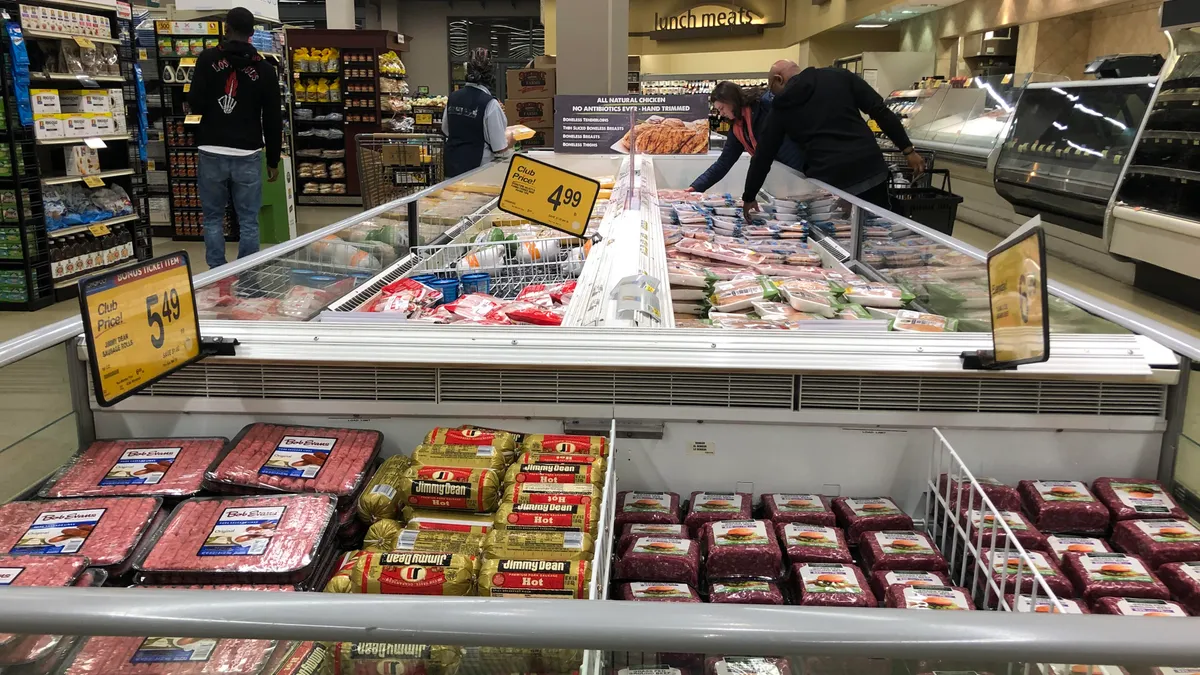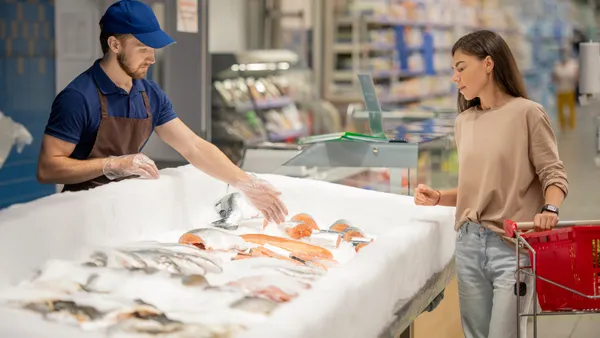Dive Brief:
- JBS USA Holdings CEO Andre Nogueira told The Wall Street Journal the pandemic is expected to slow meat production in America for several months.
- Nogueira said JBS USA is reconfiguring its facilities to space out employees more, and roughly 10% of its workers have been sent home because they are at higher risk for coronavirus. "We will not be able to go to full capacity anytime soon as we fight this virus because of all the changes we have implemented," he said.
- The company is a part of Brazil-based meat conglomerate JBS SA, which just posted a $1 billion net loss in the first quarter. JBS slaughters about 23% of cattle in the U.S. and makes roughly a fifth of its pork.
Dive Insight:
With financial losses and depleted operations, the issues facing the meat industry aren't expected to clear up anytime soon. As increased safety measures and limited staffing slow plant operations, some companies are still warning of the potential of empty meat cases. JBS is the largest beef producer in the U.S., and despite new efforts to keep plants open, its top executive is still concerned about production.
As coronavirus has spread rapidly among employees in meatpacking facilities, sickening thousands and killing at least 20 workers, more than 30 meat processing plants across the country — including several owned by JBS — have temporarily closed or reduced production. Many have criticized the meat industry for waiting too long to implement safety measures and shutter facilities, but as supply has become a concern, the pressure to reopen plants and keep them running has escalated.
President Donald Trump issued an executive order in April declaring meat plants "critical infrastructure" using the Defense Production Act in order to keep them open and help prevent shortages. Labor unions and workers have criticized the move, saying it puts workers at risk. While the meat industry has largely applauded the order, companies such as JBS have said it will take a while to get production back to full capacity.
JBS has reopened plants it shuttered in Minnesota, Pennsylvania, Colorado and Wisconsin after workers tested positive. Their plants are now producing at 70% to 95% of their normal capacity, The Wall Street Journal reported.
About 6,000 JBS workers, who are over 60 years old or have preexisting health conditions, have been told to stay home. Additionally, absenteeism from workers afraid of catching the virus has continued to be a problem for plants. But the company did hire 1,000 new workers in response, with about half to do the extra cleaning in plants, Nogueira said.
Despite concerns about meat supply in U.S. grocery stores, an analysis from Reuters found U.S. meat shipments overseas have skyrocketed. Pork supplies dropped about 40% since mid-March in the U.S. because of shuttered plants, but pork shipments to China have more than quadrupled during the same period, according to USDA data. But JBS's Nogueira said the company is selling more meat domestically than exporting it.
"Will we have all the items in the grocery store? Probably not for the next several weeks, but at this point I am not concerned about a shortage of protein," Nogueira said.
Companies are not the only ones warning of a longer-term impact. A new report from CoBank found even if the reduced processing capacity at these U.S. meat plants is just for a short time, it will likely have a lasting impact on meat processors, producers, retailers and consumers in America. Meat supplies for grocery stores could drop 30% by Memorial Day, resulting in pork and beef price increases as high as 20% compared to last year, CoBank predicted.
As analysts and executives continue to express concerns about production for months to come, companies will need to find ways to produce enough product to keep shelves stocked here and abroad.














